This morning, as part of National Library Week, American Library Association released their Top Ten Challenged Books of 2021. Each year, ALA compiles the report and list from information gathered from library staff across the country year-round. Schools, universities, and libraries received 729 challenges covering 1,597 books and materials. This marks the highest number of challenges in a single year since the tracking began twenty years ago.
It is no surprise that Maia Kobabe’s Gender Queer: A Memoir tops the list this year. In 2021 and beyond, we have seen a continuation of the assault on books by and about BIPOC and LGBTQIA+ persons. This year has also seen a “weaponization” of graphic novels. In many places, the visual nature of the comics medium has been taken out of context and misconstrued to create social media moments instead of community conversation.
Below is the list of books from ALA’s Top Ten Challenged Books of 2021, including a brief description and the reason/s for its challenges.
Gender Queer: A Memoir by Maia Kobabe
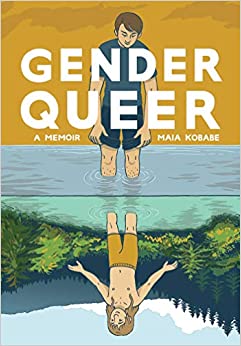
In 2014, Maia Kobabe, who uses e/em/eir pronouns, thought that a comic of reading statistics would be the last autobiographical comic e would ever write. At the time, it was the only thing e felt comfortable with strangers knowing about em. Now, Gender Queer is here. Maia’s intensely cathartic autobiography charts eir journey of self-identity, which includes the mortification and confusion of adolescent crushes, grappling with how to come out to family and society, bonding with friends over erotic gay fanfiction, and facing the trauma and fundamental violation of pap smears.
Started as a way to explain to eir family what it means to be nonbinary and asexual, Gender Queer is more than a personal story: it is a useful and touching guide on gender identity—what it means and how to think about it—for advocates, friends, and humans everywhere.
Reasons: Banned, challenged, and restricted for LGBTQIA+ content and because it was considered to have sexually explicit images.
Lawn Boy by Jonathan Evison
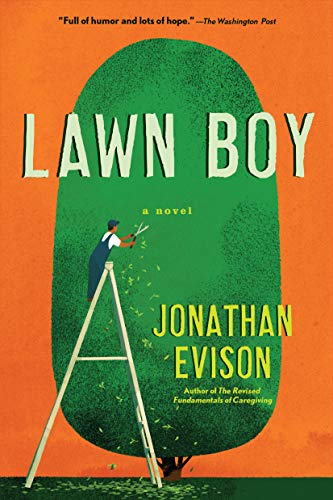
For Mike Muñoz, a young Chicano living in Washington State, life has been a whole lot of waiting for something to happen. Not too many years out of high school and still doing menial work—and just fired from his latest gig as a lawn boy on a landscaping crew—he knows that he’s got to be the one to shake things up if he’s ever going to change his life. But how?
In this funny, angry, touching, and ultimately deeply inspiring novel, bestselling author Jonathan Evison takes the reader into the heart and mind of a young man on a journey to discover himself, a search to find the secret to achieving the American dream of happiness and prosperity. That’s the birthright for all Americans, isn’t it? If so, then what is Mike Muñoz’s problem? Though he tries time and again to get his foot on the first rung of that ladder to success, he can’t seem to get a break. But then things start to change for Mike, and after a raucous, jarring, and challenging trip, he finds he can finally see the future and his place in it. And it’s looking really good.
Reasons: Banned and challenged for LGBTQIA+ content and because it was considered to be sexually explicit.
All Boys Aren’t Blue by George M. Johnson
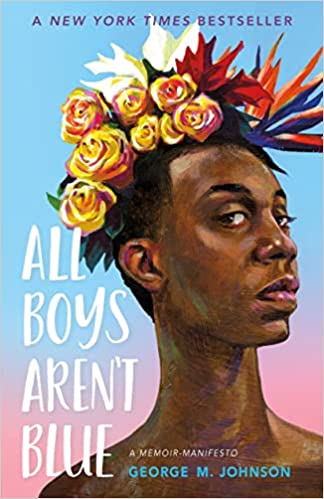
In a series of personal essays, prominent journalist and LGBTQIA+ activist George M. Johnson explores his childhood, adolescence, and college years in New Jersey and Virginia. From the memories of getting his teeth kicked out by bullies at age five, to flea marketing with his loving grandmother, to his first sexual relationships, this young-adult memoir weaves together the trials and triumphs faced by Black queer boys.
Both a primer for teens eager to be allies as well as a reassuring testimony for young queer men of color, All Boys Aren’t Blue covers topics such as gender identity, toxic masculinity, brotherhood, family, structural marginalization, consent, and Black joy. Johnson’s emotionally frank style of writing will appeal directly to young adults.
Reasons: Banned and challenged for LGBTQIA+ content, profanity, and because it was considered to be sexually explicit.
Out of Darkness by Ashley Hope Perez
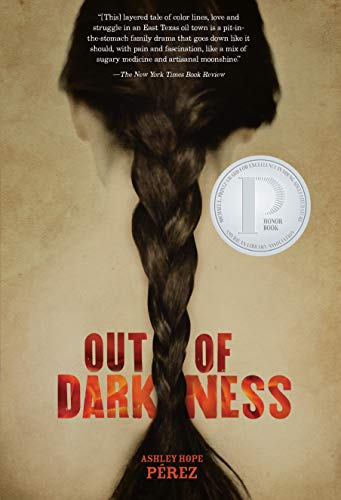
New London, Texas. 1937. Naomi Vargas and Wash Fuller know about the lines in East Texas as well as anyone. They know the signs that mark them. They know the people who enforce them. But sometimes the attraction between two people is so powerful it breaks through even the most entrenched color lines. And the consequences can be explosive.
Ashley Hope Pérez takes the facts of the 1937 New London school explosion—the worst school disaster in American history—as a backdrop for a riveting novel about segregation, love, family, and the forces that destroy people.
Reasons: Banned, challenged, and restricted for depictions of abuse and because it was considered to be sexually explicit.
The Hate U Give by Angie Thomas
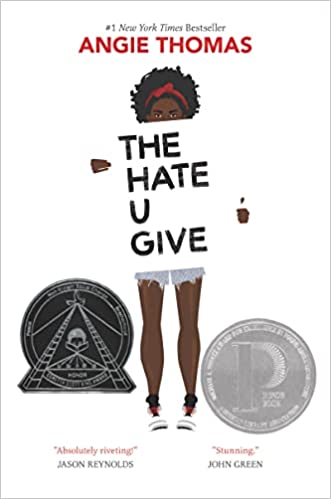
Sixteen-year-old Starr Carter moves between two worlds: the poor neighborhood where she lives and the fancy suburban prep school she attends. The uneasy balance between these worlds is shattered when Starr witnesses the fatal shooting of her childhood best friend Khalil at the hands of a police officer. Khalil was unarmed.
Soon afterward, his death is a national headline. Some are calling him a thug, maybe even a drug dealer and a gangbanger. Protesters are taking to the streets in Khalil’s name. Some cops and the local drug lord try to intimidate Starr and her family. What everyone wants to know is: what really went down that night? And the only person alive who can answer that is Starr.
But what Starr does—or does not—say could upend her community. It could also endanger her life.
Reasons: Banned and challenged for profanity, violence, and because it was thought to promote an anti-police message and indoctrination of a social agenda.
The Absolutely True Diary of a Part-Time Indian by Sherman Alexie
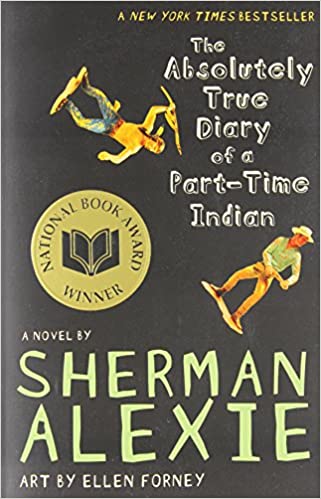
Sherman Alexie tells the story of Junior, a budding cartoonist growing up on the Spokane Indian Reservation. Determined to take his future into his own hands, Junior leaves his troubled school on the rez to attend an all-white farm town high school where the only other Indian is the school mascot.
Heartbreaking, funny, and beautifully written, The Absolutely True Diary of a Part-Time Indian, which is based on the author’s own experiences, coupled with poignant drawings by Ellen Forney that reflect the character’s art, chronicles the contemporary adolescence of one Native American boy as he attempts to break away from the life he was destined to live.
Reasons: Banned and challenged for profanity, sexual references and use of a derogatory term.
Me and Earl and the Dying Girl by Jesse Andrews
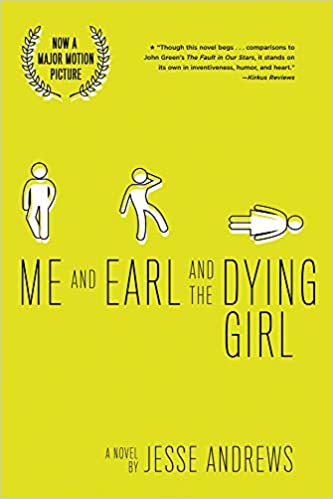
It is a universally acknowledged truth that high school sucks. But on the first day of his senior year, Greg Gaines thinks he’s figured it out. The answer to the basic existential question: How is it possible to exist in a place that sucks so bad? His strategy: remain at the periphery at all times. Keep an insanely low profile. Make mediocre films with the one person who is even sort of his friend, Earl.
This plan works for exactly eight hours. Then Greg’s mom forces him to become friends with a girl who has cancer. This brings about the destruction of Greg’s entire life.
Reasons: Banned and challenged because it was considered sexually explicit and degrading to women.
The Bluest Eye by Toni Morrison
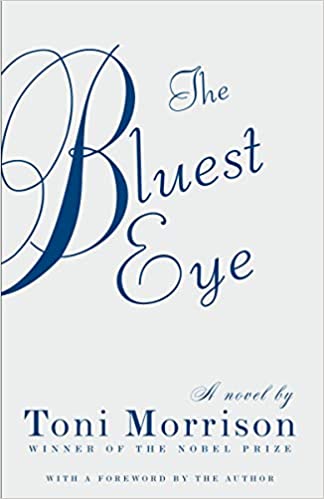
Morrison’s acclaimed first novel, Pecola Breedlove—an 11-year-old Black girl in an America whose love for its blond, blue-eyed children can devastate all others—prays for her eyes to turn blue: so that she will be beautiful, so that people will look at her, so that her world will be different. This is the story of the nightmare at the heart of her yearning, and the tragedy of its fulfillment.
Reasons: Banned and challenged because it depicts child sexual abuse and was considered sexually explicit.
This Book is Gay by Juno Dawson
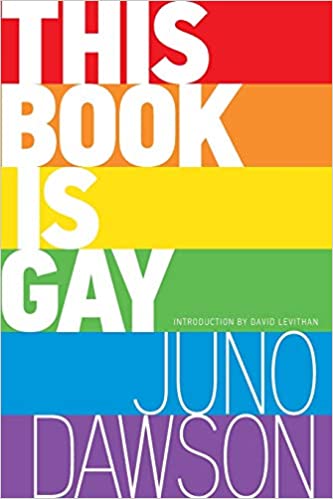
This candid, funny, and uncensored exploration of sexuality and what it’s like to grow up LGBTQ also includes real stories from people across the gender and sexual spectrums, not to mention hilarious illustrations.
You will be entertained. You will be informed. But most importantly, you will know that however you identify (or don’t) and whomever you love, you are exceptional. You matter. And so does this book.
Reasons: Banned, challenged, relocated, and restricted for providing sexual education and LGBTQIA+ content.
Beyond Magenta by Susan Kuklin
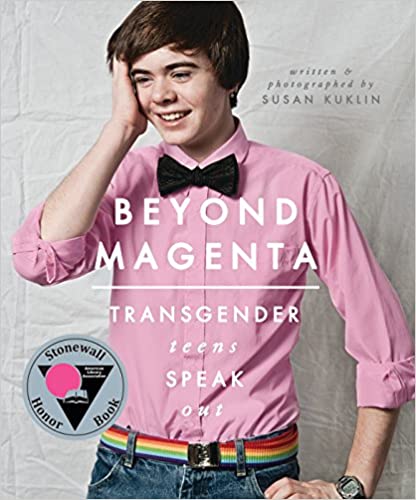
Author and photographer Susan Kuklin met and interviewed six transgender or gender-neutral young adults and used her considerable skills to represent them thoughtfully and respectfully before, during, and after their personal acknowledgment of gender preference. Portraits, family photographs, and candid images grace the pages, augmenting the emotional and physical journey each youth has taken. Each honest discussion and disclosure, whether joyful or heartbreaking, is completely different from the other because of family dynamics, living situations, gender, and the transition these teens make in recognition of their true selves.
Reasons: Banned and challenged for LGBTQIA+ content and because it was considered to be sexually explicit.
This year, the theme for National Library Week is “Connect With Your Library.” In the words of the ALA, it is “an explicit call to action—an invitation for communities to join, visit, or advocate for their local libraries.” With the rise in challenges, it is crucial now more than ever to connect.
We have seen states such as Idaho and Tennessee introducing legislative bills that would attack librarians and administration through vague accusations of “harm to minors.” CBLDF finds itself asking, “Who does censorship harm?” Eliminating diverse experiences and voices harms the entire community. CBLDF remains committed to supporting and fighting with librarians and students for their right to read – because the First Amendment relies on access to literature and ideas.
CBLDF and its partners have been battling ongoing and organized attempts to censor comics and other books in schools and libraries. You can join the struggle by making a donation or reporting censorship today!